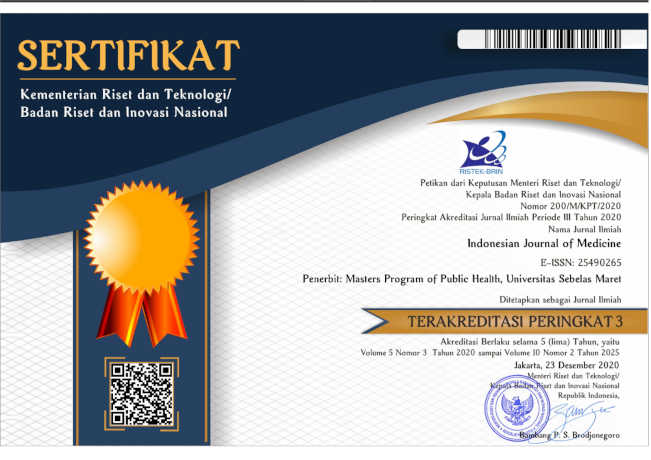Effect of Curcuma Longa Rhizome Extract on Fasting Blood Sugar Levels and HbA1C in Type 2 Diabetes Mellitus: A Meta-Analysis
DOI:
https://doi.org/10.26911/theijmed.2021.6.2.383Abstract
Background: Diabetes mellitus (DM) is a metabolic disease that is developing into a serious global problem. Diabetes mellitus is characterized by an increase in blood levels that are more than the normal reference. In type 2 DM generally occurs due to reduced insulin secretion and sensitivity over time. Control of blood sugar levels can improve the patient's quality of life. This study aimed to analyze the effect of curcuma longa rhizome extract on fasting blood sugar levels and HbA1C in patients with type 2 diabetes.
Subjects and Method: This was a meta-analysis of a number of randomized controlled trials. The articles were obtained from PubMed, Google Scholar, Springerlink, BMJ, and Sciencedirect databases, published from 2010-2020. The article search was carried out by considering the eligibility criteria defined using the PICO model. P: Type 2 diabetes patients, I: Curcuma longa rhizome extract, C: Placebo, and O: Fasting blood sugar levels and HbA1C. The keywords to find articles are as follows: "Curcuma longa", OR "Curcumin" OR "Tumeric" OR "Curcuma" AND "Fasting blood glucose" AND "HbA1C" OR "Glicemic" OR "Diabetes Mellitus" AND "Randomized Controll Trials". Articles were collected using PRISMA flow diagrams. Articles were analyzed using the Review Manager 5.3 application.
Results: A total of 14 articles were reviewed in this study. Meta-analysis of 12 articles showed that the curcuma longa rhizome extract reduced fasting blood sugar levels (Standardized Mean Difference= -0.48; 95% CI= -0.61 to -0.34; p <0.001). The meta-analysis of 11 articles showed that administration of curcuma longa rhizome extract decreased HbA1C levels (Standardized Mean Difference= -0.40; 95% CI= -0.59 to -0.20; p <0.001). This meta-analysis combines primary studies from Iran, Japan, Thailand, China, Mexico, Brazil, and Australia
Conclusion: Curcuma longa rhizome extract reduces fasting blood sugar and HbA1C levels in patients with type 2 diabetes.
Keywords: Curcuma longa, Fasting blood sugar levels, HbA1C, diabetes mellitus type 2, randomized controlled trial
Correspondence: Riska Fajar Fatony. Masters Program in Public Health, Universitas Sebelas Maret. Jl. Ir. Sutami 36A, Surakarta 57126, Central Java. Email: respatieka10@gmail.com.
Indonesian Journal of Medicine (2021), 06(02): 119-134
https://doi.org/10.26911/theijmed.2021.06.02.01
References
Adab Z, Shojaii A, Reza M, Iraj V, Eghtesadi S, Haqqani (2019). Effect of turmeric on glycemic status, lipid profile, hs-CRP, and total antioxidant capacity in hyperlipidemic type 2 diabetes melli-tus patients. Phytother Res. 33(4): 1173-1181. https://doi.org/10.1002/p-tr.6312.
Alvarenga L, Salarolli R, Cardozo LF, San-tos R, Brito JS, Ann J, Reis D (2020). Impact of curcumin supplementation on expression of in fl ammatory trans-cription factors in hemodialysis pati-ents: A randomized, double-blind, controlled study. Clin Nutr. 39(12): 3594-3600. https://doi.org/10.1016/-j.clnu.2020.03.007.
Chuengsamarn S, Rattanamongkolgul S, Luechapudiporn R, Phisalaphong C, Jirawatnotai S (2012). Curcumin ex-tract for prevention of type 2 diabetes. Diabs Care. 35(11):2121–2127. https://doi.org/10.2337/dc12-0116.
Hodaei H, Adibian M, Nikpayam O, Heda-yati M, Sohrab G (2019). The effect of curcumin supplementation on anthro-pometric indices, insulin resistance and oxidative stress in patients with type 2 diabetes: a randomized, double - blind clinical trial. Diabetol Metab Syndr. 11:41. https://doi.org/10.1186/s13098-019-0437-7.
Jimenez G, Alvarez-mej AE, Salazar SJ (2016). The effect of dietary supple-mentation with curcumin on redox status and Nrf2 activation in patients with nondiabetic or diabetic protein-uric chronic kidney disease. J Ren Nutr. 26(4):237-44. https://doi.org/-10.1053/j.jrn.2016.01.013.
Lim TK (2016). Edible medicinal and non-medicinal plants: Volume 12, modi-fied stems, roots, bulbs. Medicin. 1(2): 196-204.
Mirzabeigi P, Mohammadpour AH, Sala-rifar M, Gholami K, Mojtahedzadeh M, Javadia MR (2015). The effect of curcumin on some of traditional and non-traditional cardiovascular risk factors: A pilot randomized, double-blind, placebo-controlled trial. Iran J Pharm Res. 199(6):479–486. https:-//www.ncbi.nlm.nih.gov/pubmed/25-901155.
Mokhtari M, Razzaghi R, Momen-Heravi M (2020). The effects of curcumin intake on wound healing and meta-bolic status in patients with diabetic foot ulcer. Phytother Res. 8(1): 1–9. https://doi.org/10.1002/ptr.6957.
Na L, Li Y, Pan H, Zhou X, Sun D, Meng M, Li X (2013). Curcuminoids exert glu-cose-lowering effect in type 2 diabetes by decreasing serum free fatty acids: a double-blind, placebo-controlled trial. Mol Nutr Food Res. 57(9):1569-77. https://doi.org/10.1002/mnfr.201200131.
Nam HC, Joses K, Jean CM, Katherine O, Leonor GW (2017). Standard Medical Care in Diabetes Eighth edition IDF Diabetes Atlas, 8th edition. World: IDF.
Panahi Y, Khalili N, Sahebi E, Namazi S, Simental-Mendía LE, Majeed M, Sahebkar A (2018). Effects of curcu-minoids plus piperine on glycemic, hepatic and inflammatory biomarkers in patients with type 2 diabetes mel-litus: A randomized double-blind placebo-controlled trial. Drug Res (Stuttg). 68(7): 403-409. https://doi.org/10.1055/s-0044-101752.
Perkumpulan Endokrinologi Indonesia (2015). Pengelolaan dan Pencegahan Diabetes Melitus Tipe 2 di Indonesia. PERKENI: Jakarta
Perkumpulan Endokrinologi Indonesia. (2019). Pedoman pengelolaan dan pencegahan diabetes melitus tipe 2 dewasa di Indonesia (Guidelines for the management and prevention of adult type 2 diabetes mellitus in Indo-nesia). PERKENI: Jakarta
Rahimi HR, Mohammadpour AH, Dastani M, Jaafari MR, Abnous K, Mobarhan MG, Oskuee RK(2013). The effect of nano-curcumin on HbA1c, fasting blood glucose, and lipid profile in diabetic subjects: a randomized clini-cal trial. J Chem Inf Model. 53(9): 1689–1699. http://www.ncbi.nlm.ni-h.gov/pmc/articles/pmc5052420/.
Riskesdas K (2018). Hasil Utama Riset Kesehatan Dasar (RISKESDAS) (Main Results of Basic Health Research (RISKESDAS). Journal of Physics .44(8): 1–200.
Roxo DF, Arcaro CA, Gutierres VO, Costa MC, Oliveira JO, Lima TFO, Assis R (2019). Curcumin combined with metformin decreases glycemia and dyslipidemia, and increases paraoxo-nase activity in diabetic rats. Diabetol Metab Syndr. 11(1): 1–8. https://doi.org/10.1186/s13098-019-0431-0.
Shi J, Hu H, Harnett J, Zheng X, Liang Z, Wang YT, Ung COL (2019). An eva-luation of randomized controlled trials on nutraceuticals containing traditional Chinese medicines for diabetes management: A systematic review. Chinese Med. 14(1): 1–20. https://doi.org/10.1186/s13020-019-0276-3.
Vanaie A, Shahidi S, Iraj B, Siadat ZD, Kabirzade M, Shakiba F (2019). Cur-cumin as a major active component of turmeric attenuates proteinuria in patients with overt diabetic nephro-pathy. J Res Med Sci. 24: 77. https://-doi.org/10.4103/jrms.jrms_1055_18.
WHO (2019). Classification of diabetes mellitus. In Clinics in Laboratory Medicine. 21(1):168-179.











